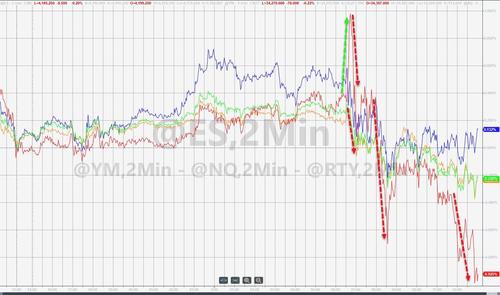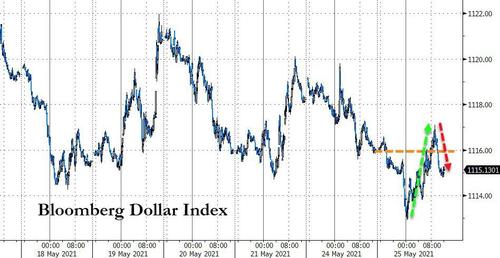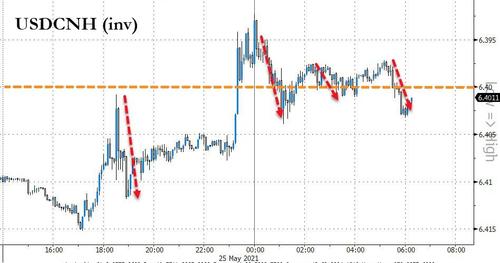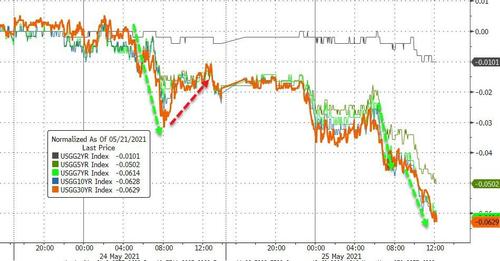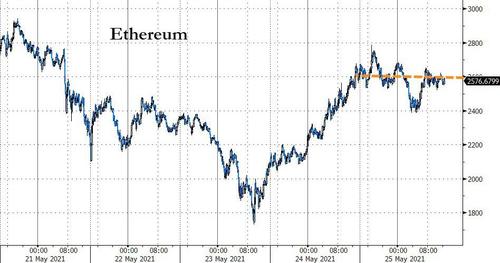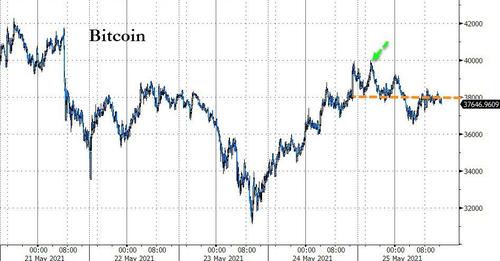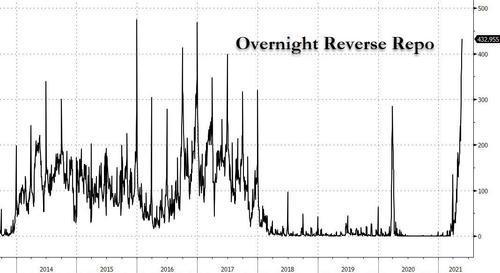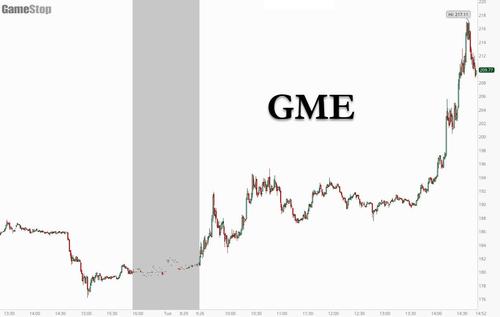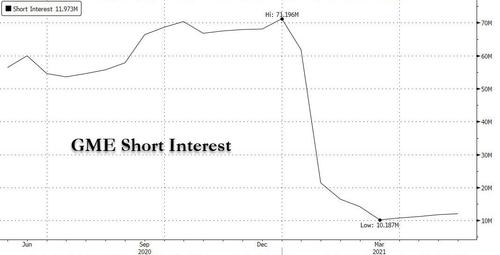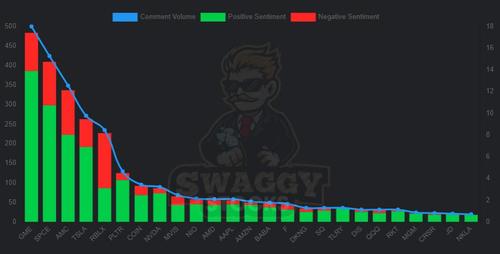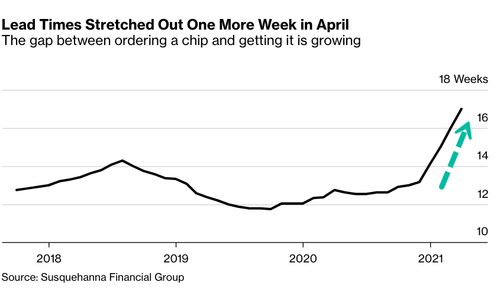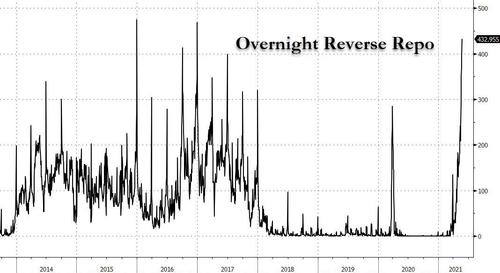Authored by Glenn Greenwald via Substack,
What Belarus did, while illegal, is not unprecedented. The dangerous tactic was pioneered by the same U.S. and E.U. officials now righteously condemning it…

Bolivian President Evo Morales holds a press conference at the Vienna International Airport on July 3, 2013, angrily denying any wrongdoing on Wednesday after his plane was diverted to Vienna over suspicion fugitive US intelligence leaker Edward Snowden was on board. (Photo: Patrick Domingo/AFP via Getty Images)
U.S. and E.U. governments are expressing outrage today over the forced landing by Belarus of a passenger jet flying over its airspace on its way to Lithuania. The Ryanair commercial jet, which took off from Athens and was carrying 171 passengers, was just a few miles from the Lithuanian border when a Belarusian MiG-29 fighter jet ordered the plane to make a U-turn and land in Minsk, the nation’s capital.
On board that Ryanair flight was a leading Belarusian opposition figure, 26-year-old Roman Protasevich, who, fearing arrest, had fled his country in 2019 to live in exile in neighboring Lithuania. The opposition figure had traveled to Athens to attend a conference on economics with Belarus’ primary opposition leader Svetlana Tikhanovskaya and was attempting to return home to Lithuania when the plane was forcibly diverted.
Protasevich, when he was teenager, became a dissident opposed to Belarus’ long-time authoritarian leader Aleksandr Lukashenko, and has only intensified his opposition in recent years. When Lukashenko last year was “re-elected” to his sixth term as president in a sham election, the largest and most sustained anti-Lukashenko protests in years erupted. Protasevich, even while in exile, was a leading oppositional voice, using an anti-Lukashenko channel on Telegram — one of the few remaining outlets dissidents have — to voice criticisms of the regime. For those activities, he was formally charged with various national security crimes, and then, last November, was placed on the official “terrorist list” by Belarus’ intelligence service (still called the “KGB” from its days as a Soviet republic).
Lukashenko’s own press service said the fighter jet was deployed on orders of the leader himself, telling the Ryanair pilot that they believed there was a bomb or other threat to the plane on board. When the plane landed in Minsk, an hours-long search was conducted and found no bomb or any other instrument that could endanger the plane’s safety, and the plane was then permitted to take off and land thirty minutes later at its intended destination in Lithuania. But two passengers were missing. Protasevich was quickly detained after the plane was forced to land in Minsk and is now in a Belarusian jail, where he faces a possible death sentence as a “terrorist” and/or a lengthy prison term for his alleged national security crimes. His girlfriend, traveling with him, was also detained despite facing no charges. Passengers on the flight say Protasevich began panicking when the pilot announced that the plane would land in Minsk, knowing that his fate was sealed and telling other passengers that he faces a death sentence.
Anger over this incident from American and European governments came swiftly and vehemently. “We strongly condemn the Lukashenko regime’s brazen and shocking act to divert a commercial flight and arrest a journalist,” U.S. Secretary of State Antony Blinken posted on Twitter on Sunday night, adding that U.S. officials “demand an international investigation and are coordinating with our partners on next steps.”
Because the E.U. includes as member states both the departing country of the flight (Greece) and its intended destination (Lithuania), and because Ryanair is based in another E.U. country (Ireland), its officials are expressing similar condemnations. EU Commission head Ursula von der Leyen denounced the forced landing as “outrageous and illegal behavior” and warned it “will have consequences”. The leaders of Lithuania and Ireland demanded serious retaliation and sanctions. It is unclear what retaliatory options are available given the strong international sanctions regime already imposed on Lukashenko and his allies.
There is little doubt that the forced landing of this plane by Belarus, with the clear intention to arrest Protasevich, is illegal under numerous conventions and treaties governing air space. Any forced landing of a jet carries dangers, and safe international air travel would be impossible if countries could force planes flying with permission over their air space to land in order to seize passengers who might be on board. This act by Belarus merits all the condemnation it is receiving.
Yet news accounts in the West which are depicting this incident as some sort of unprecedented assault on legal conventions governing air travel and basic decency observed by law-abiding nations are whitewashing history. Attempts from U.S. officials such as Blinken and E.U. bureaucrats in Brussels to cast the Belarusians’ behavior as some sort of rogue deviation unthinkable for any law-respecting democracy are particularly galling and deceitful.
* * *
In 2013, the U.S. and key E.U. states pioneered the tactic just used by Lukashenko. They did so as part of a failed scheme to detain and arrest the NSA whistleblower Edward Snowden. That incident at the time caused global shock and outrage precisely because, eight years ago, it was truly an unprecedented assault on the values and conventions they are now invoking to condemn Belarus.
In July of that year, the democratically elected President of Bolivia, Evo Morales, had traveled to Russia for a routine international conference attended by countries which export natural gas. At the time of Morales’ trip, Edward Snowden was in the middle of a bizarre five-week ordeal where he was stranded in the international transit zone of Sheremetyevo Airport in Moscow, unable to board a flight to leave Russia or exit the airport to enter Russia.
On June 23, Hong Kong officials rejected a demand from the U.S. Government that they arrest Snowden and hand him over to the U.S. Hong Kong was the city Snowden chose to meet the two journalists he had selected (one of whom was me) because of what he regarded as the city’s noble history of fighting against repression and for independence and free expression. When announcing their refusal to hand over Snowden, Hong Kong officials issued a remarkably defiant, even mocking statement explaining that Snowden had been permitted to leave Hong Kong “on his own accord.” That statement also accused the U.S. of having issued a legally improper and inaccurate extradition demand which they were duty-bound to reject, and then pointedly noted that the real crime requiring investigation was U.S. spying on the populations of the rest of the world.
Snowden thus left Hong Kong that day with the intent to fly to Moscow, then immediately board a flight to Cuba, and then proceed to his ultimate destination in a Latin American country — Bolivia or Ecuador — in order to seek asylum there. But even after then-President Barack Obama denied that the U.S. Government would be “wheeling and dealing” in order to get Snowden into U.S. custody — “I’m not going to be scrambling jets to get a 29-year-old hacker,” he dismissively claimed during a June press conference — the U.S. Government was, in reality, doing everything in its power to prevent Snowden from evading the clutches of the U.S. Government.
Led by then-Vice President Joe Biden, U.S. officials warned every country in both Europe and South America said to be considering shelter for Snowden of grave consequences should they offer asylum to the whistleblower. Threats to Havana caused the Cuban government to rescind its commitment of safe passage they had issued to Snowden’s lawyer. Under Biden’s pressure, Ecuador also reversed itself by proclaiming the safe passage document issued to Snowden was a mistake.
And on the day that Snowden had left Hong Kong, the U.S. State Department unilaterally cancelled his passport, which is why, upon landing in Moscow, he was barred from boarding his next international flight, destined for Havana. With the Russian government unable to allow him to board a flight due to his invalidated passport and with Snowden’s asylum requests pending both with Russia and close to two dozen other states, he was forced to remain in the airport until August 1, when Moscow finally granted him temporary asylum. He has lived there ever since. This has always been a staggering irony of the Snowden story: the primary attack on him by U.S. officials to impugn his motives and patriotism is that he lives in Russia and thus likely cooperated with Russian authorities (a claim for which no evidence has ever been presented), when the reality is that Snowden would have left Russia eight years ago after a 30-minute stay in its airport had U.S. officials not used a series of maneuvers that barred him from leaving.
(Obama’s claim to not care much about Snowden was issued at roughly the same time that the U.S. and U.K. governments were engaged in other extreme acts, including sending law enforcement agents into The Guardian‘s London newsroom to force them to physically destroy their computers used to store their copy of the Snowden archive, as well as detaining my husband, David Miranda, under a terrorism law at Heathrow Airport, with the advanced knowledge of the Obama administration).
While in Moscow, President Morales — on July 1, the day before he was scheduled to return to Bolivia — gave an interview to a local Russian outlet in which he said Bolivia would be open to the possibility of granting asylum to Snowden. The next day, Morales boarded Bolivia’s presidential jet to fly back to La Paz as scheduled, with a flight plan that including flying over several E.U. member states — including Austria, France, Spain, Italy and Portugal, as well as Poland and the Czech Republic — with a stop to refuel in Spain’s Canary Islands.
The Bolivian plane flew through Poland and the Czech Republic without incident. But flight records show that while flying over Austria toward France the plane suddenly took a sharp turn to the east, back to the Austrian capital of Vienna, where it made an unscheduled landing. Morales and his entourage were stranded there for twelve hours before re-boarding the plane and flying back to Bolivia.
Bolivian officials immediately announced that in mid-flight, they were told by France, Spain and Italy that their permission to fly over those countries’ air space had been rescinded. Without enough fuel to fly an alternative route, the Bolivian pilot was forced to make a U-turn and land in Vienna. Bolivian officials were told that the reason for the mid-air refusal of these E.U. countries to allow use of their airspace was because of assurances they were given by an unspecified foreign government that Snowden was on the plane with Morales, and that he was traveling because Bolivia had granted him asylum.
After Morales’ plane was forced to land at the Vienna airport, Austrian officials quickly announced that they had searched the plane and determined that Snowden was not on it. While Bolivia denied that they consented to any such search of the presidential plane, Bolivian officials angrily mocked the notion that Snowden would be secretly smuggled by Morales from Russia to Bolivia. The whole time this was happening, Snowden was in Moscow. Needless to say, had Snowden been on Morales’ plane that was forced to land in Vienna, Austrian officials would have instantly detained him and turned him over to the U.S., which had by then issued an international arrest warrant. The only reason Snowden did not suffer the same fate that day as the one Protasevich suffered on Sunday is because he happened not to be on the targeted plane that was forced to make an unscheduled landing in Vienna.
The international outrage toward the E.U. and U.S. over the forced downing of the Bolivian presidential plane poured forth just as swiftly and intensely as the outrage now coming from those states to Belarus. Bolivia’s U.N. Ambassador called it an attempted “kidnapping” — exactly the term which the states he so accused are now using for Belarus. Brazil’s then-President Dilma Rousseff expressed “outrage and condemnation.” Then-Argentine President Cristina Kirchner described the downing of Morales’ plane as the “vestiges of a colonialism that we thought were long over,” adding that it “constitutes not only the humiliation of a sister nation but of all South America.” Even the U.S.-dominated Organization of American States expressed its “deep displeasure with the decision of the aviation authorities of several European countries that denied the use of airspace,” adding that “nothing justifies an act of such lack of respect for the highest authority of a country.”
As the controversy exploded, the key E.U. states tried at first to falsely deny that they played any role in the incident, insisting that they had not closed their airspace to Bolivia’s plane. France had quickly claimed that while it had originally denied use of its airspace to the Bolivian plane while in mid-air, then-President Francois Hollande reversed that decision after he learned Morales was on board. Eventually, though, the French fully admitted the truth: “France has apologised to Bolivia after Paris admitted barring the Bolivian president’s plane from entering French air space because of rumors Edward Snowden was on board.”
Meanwhile, Spain also ended up apologizing to Bolivia. Its then-Foreign Minister cryptically admitted: “They told us they were sure… that he was on board.” Though the Spanish official refused to specify who the “they” was — as if there were any doubts — he acknowledged that the assurances they got that Snowden was on board Morales’ plane was the only reason they took the actions they did to force the plane of the Bolivian leader to land. “The reaction of all the European countries that took measures – whether right or wrong – was because of the information that had been passed on. I couldn’t check if it was true or not at that moment because it was necessary to act straight away,” he said. While denying Spanish authorities had fully “closed” its airspace to Morales, they acknowledged what they called “delays” in approving mid-flight air space rights forced Morales to land in Austria and apologized for this having been handled “inappropriately” by Madrid.

BBC, July 5, 2013
Along with numerous other countries, Bolivia had no doubt about who it was who told all these countries, falsely, that they were certain Snowden was on Morales’ plane and thus demanded it be forced to land. Its defense minister, who was on the plane, left no doubt on this question: “This is a hostile act by the United States State Department which has used various European governments.” The Bolivian foreign minister said that these countries, at the behest of the Obama administration, conspired to “put at risk the life of the president.”
Given that it was only the U.S. which was so desperate to get their hands on Snowden — they had already used Vice President Biden to lead a highly coercive effort to threaten countries with punishment if they gave him asylum — few doubted where this false intelligence originated and who was behind the unprecedented act of forcing a presidential plane to land. Indeed, all of this was so glaringly obvious that not even the U.S. government was willing to deny it.
The duty to answer international questions about this incident was left to the spokesperson for the Obama State Department. At the time, that position was occupied by Jen Psaki, now the Biden White House Press Secretary. As he so often does, the Associated Press’s State Department reporter Matt Lee led the way in relentlessly pressing Psaki, demanding answers to what role the U.S. played in this incident. As she so often does, Psaki did everything possible to refuse even minimal transparency — neither admitting nor denying that the U.S. was behind all of this — yet she nonetheless made critical concessions at the July 3 State Department Press Briefing:
QUESTION: Did the U.S. have any role in encouraging Western European countries to block the flight of the Bolivian President yesterday? Was there any communication between the U.S. and those countries in the affair?
MS. PSAKI: Well, as you know because we’ve talked about it quite a bit in here, the U.S. has been in touch – the United States, I should say, officials – have been in touch with a broad range of countries over the course of the last 10 days. And we haven’t – I haven’t listed those countries; I’m certainly not going to do that today.
Our position on Mr. Snowden has also been crystal clear in terms of what we want to happen, and that message has been communicated both publicly and privately in a range of these conversations we’ve had with countries. And let me just repeat: He’s been accused of leaking classified information. He’s been charged with three felony accounts and should be returned to the United States. I don’t know that any country doesn’t think that that is what the United States would like to happen. . . .
QUESTION: There’s been a great deal of criticism though from Latin American leaders about the decision, not least because Snowden doesn’t appear to have been on board. You don’t sound like you’re denying that there were conversations about this. I mean, they – a number of Latin American leaders today have specifically criticized the U.S. for intervening in a diplomatic flight. Are you – am I right in understanding you’re not denying there were conversations about that?
MS. PSAKI: I’m not going to get into diplomatic conversations that happened over the past 10 days and which countries they were with, but I would point you to the countries that you’re referring to and ask you to ask them about decisions that were made.
QUESTION: But Jen, were you in communication with those countries or alerted to the fact that they would be either – well, not allowing a certain plane to land – the President’s plane?
MS. PSAKI: We have been in contact with a range of countries across the world who had any chance of having Mr. Snowden land or even transit through their countries, but I’m not going to outline when those were or what those countries have been.
QUESTION: Jen —
QUESTION: Why isn’t it unseemly for any country to essentially deny a head of state safe passage through its airspace? Why – regardless of whether Snowden was on that plane, why isn’t that in and of itself patently offensive?
MS. PSAKI: Well, Roz, I would point you to those specific countries to answer that question.
QUESTION: But if the – if a similar situation were to happen involving Air Force One, it would be an international incident.
MS. PSAKI: I’m not getting into a hypothetical. That’s not something that is currently happening that we’re currently discussing. . . .
QUESTION: Can you say whether the United States or whether you are aware that the U.S. Government ever at some point had any information that Snowden might be on this plane?
MS. PSAKI: I’m not aware of – I’m not aware of, but not something I would get into even if I did know. . . .
QUESTION: At the airport, the Austrian authorities searched the plane of Morales. Did the U.S. ask for that?
MS. PSAKI: Again, we – I would point you to all of these individual countries to describe to you what happened and why any various decisions were made.
QUESTION: Did you consult with Austrian authorities when they let the plane touch down, when they let plane go on the ground?
MS. PSAKI: I think my last answer answered that question.
That exchange led to headlines confirming what most had already strongly suspected: “US admits contact with other countries over potential Snowden flights.” As Psaki put it, even while refusing to admit that the U.S. was behind the downing of Morales’ plane: “I don’t know that any country doesn’t think that that is what the United States would like to happen.”
Illustrating how little the U.S. cares about even pretending to abide by the standards it imposes on others, the Biden administration on Monday sent out Psaki herself to condemn Belarus’ conduct as “a shocking act” and “a brazen affront to international freedom and peace and security by the regime.” It would not even occur to Biden officials — just for the sake of appearances if nothing else — to try to find someone to do this other than the same person who, in 2013, obfuscated and defended the actions of the U.S. and E.U. in doing the same thing to Bolivia’s presidential plane. U.S. officials simply do not believe that they are bound by the same standards to which its adversaries must be subjected.
None of what happened with this Morales incident has any bearing on the justifiability of what Belarus did on Sunday. That the U.S. and its E.U. allies committed a dangerous international crime in 2013 does not mitigate the criminal nature of similar actions by Belarus or any other country eight years later. The dangers of forcing down airplanes in order to arrest someone who is suspected to be on that plane are manifest. The danger increases, not decreases, as more countries do it.
But no journalist, especially Western ones, should be publishing articles or broadcasting stories falsely depicting Sunday’s incident as an unprecedented assault that could be perpetrated only by a Russian-allied autocrat. The tactic was pioneered by the very countries who today are most vocally condemning what happened. Any reporting of this story that excludes this vital history and context in favor of a false narrative of this being “unprecedented” — as is true of the vast majority of Western media reports about what Belarus did — does a grave disservice to both journalism and the truth. If it is outrageously dangerous and criminal to force the downing of a plane to arrest the passenger Roman Protasevich, then it must be equally dangerous and criminal to do the same in an attempt to arrest suspected passenger Edward Snowden.
Indeed, the only two differences between these situations that one can locate are factors against the Western nations responsible for the downing of Morales’ plane. Unlike what Belarus did, the U.S. and its European allies obviously had no confirmation of Snowden’s presence on the plane. They forced it to land based on a guess, on rumor, on speculation, which turned out to be utterly false. The second difference is that there are obviously additional international and diplomatic implications from forcing the plane of a democratically elected president to land as opposed to a standard passenger jet: that is, at the very least, a profound attack on the sovereignty of that country. Again, there are no valid justifications for what Belarus did, but to the extent one wants to distinguish its actions from what US/EU nations did in 2013, those are the only identifiable differences.

The Washington Post, July 3, 2013
The blatant double standards the U.S. and Europe have endlessly tried to impose upon the world — whereby they are freely permitted to do exactly what they condemn when done by others — is not just a matter of standard lawlessness and hypocrisy. While there was extensive coverage in the Western press on the downing of Morales’ plane, there was not even a fraction of the media indignation expressed over the actions by their own governments as they are now conveying when the same is done by Belarus. In Western media discourse, only Bad Countries are capable of bad acts; the U.S. and its allies are capable, at worst, only of well-intentioned mistakes. Thus do the exact same actions by each side receive radically different narrative treatment from the Western press corps.
When the U.S. media helps to perpetuate this narrative, it deceives and misleads the audience they purportedly inform by concealing the bad acts of the U.S. and implying if not stating that such acts are the sole province of the Bad Countries who are adverse to the U.S. Doing so both enables rogue nation behavior by Western powers and implants jingoistic propaganda. It is hard to imagine a case where this dynamic is more vividly present than this outpouring of outrage at Belarus for doing exactly that which the U.S. and Europe did to Bolivia in 2013.
